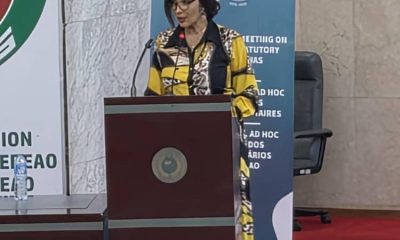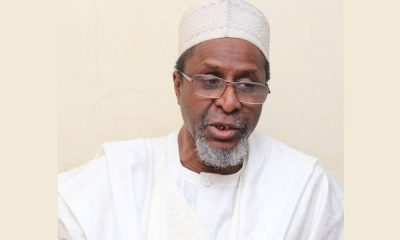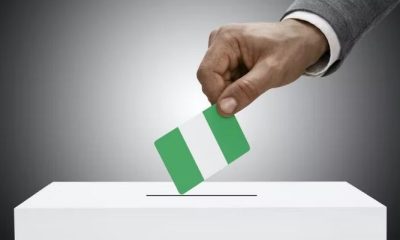NATIONAL NEWS
EU, Germany Inject €17.9m Into Nigeria’s Energy Sector, Boosts Renewable Energy, Electrification

Abuja, Nigeria – The European Union (EU) and the German government have announced a €17.9 million commitment to Nigeria’s energy sector, marking a significant boost to the country’s efforts to promote renewable energy, energy efficiency, and rural electrification.
The funding comes through the third phase of the Nigerian Energy Support Programme (NESP), launched on Thursday in Abuja.
NESP, a joint initiative between the EU, the German Federal Ministry for Economic Cooperation and Development (BMZ), and the Nigerian government, has been supporting Nigeria’s energy sector since 2013.
This latest phase will focus on building upon the successes of the previous two phases, attracting further investment in renewables, and enhancing energy efficiency measures.
The announcement was made during a ceremony attended by key stakeholders, including the Permanent Secretary of the Federal Ministry of Power, Mahmuda Mamman, the Head of Section Green and Digital Economy at the EU Delegation to Nigeria and ECOWAS, Inga Stefanowicz, and the Deputy Ambassador of the Federal Republic of Germany, Johannes Lehne.
The €17.9 million funding package, comprising €8.9 million from the German government and €9 million from the EU, demonstrates the continued commitment of both partners to supporting Nigeria’s energy transition goals.
This commitment aims to strengthen the Nigerian energy sector, diversify its energy mix, and mitigate the impacts of climate change.
“This is a welcome development,” said Mr. Mamman, highlighting the significance of the third phase in building upon the achievements of the previous phase.
“It will attract more investments in renewable energy and energy efficiency and support the objectives of the Nigeria Electricity Act 2013, aimed at stabilizing the electricity market in states.”
Ms. Stefanowicz emphasized the EU’s commitment to a cleaner energy future for Nigeria.
“The EU is pleased to have commissioned additional funding for the third phase of the programme to continue supporting the development of various frameworks and innovative models, bringing a new landscape to the concept of electricity franchising, attracting renewable energy investments and ensuring reliable power supply to its beneficiaries,” she stated.
Mr. Lehne echoed this commitment, highlighting the importance of promoting renewable energy technologies and investments as key drivers for diversifying Nigeria’s energy mix and decarbonizing key sectors identified in the country’s Energy Transition Plan.
“Technologies and investments for renewable energy and energy efficiency will be key for diversifying Nigeria’s energy mix and decarbonising the five (5) critical sectors identified in the Energy Transition Plan (ETP),” Mr. Lehne said.
The third phase of NESP will prioritise a number of key initiatives to achieve its objectives:
- Promoting sustainable energy generation: This includes providing support for rural communities, healthcare centers, and businesses in accessing clean and reliable energy sources.
- Enhancing energy efficiency: The program will focus on promoting efficient energy utilisation to reduce consumption and minimise waste.
- Bridging the energy and electricity data gap: Addressing data gaps in energy usage and electricity generation will be critical for informed decision-making and effective policy implementation.
- Strengthening private sector investments: The program will support the development of a more conducive environment for private sector investment in renewable energy and energy efficiency.
- Developing the capacities of regulatory agencies and local financial institutions: Strengthening regulatory bodies and financial institutions will be crucial for promoting sustainable energy development in the long term.
The success of the third phase of NESP hinges on the active participation and collaboration of public and private stakeholders.
Mr. Duke Benjamin, Head of Programme for NESP, emphasised the importance of this collaborative approach.
“Active participation of and collaboration with the public and private stakeholders is critical to improve availability and reliability of energy in Nigeria,” he stated.
“The 3rd phase of the programme would offer support ranging from sustainable energy generation for rural communities, healthcare centres and businesses, efficient utilisation of energy, bridging the energy and electricity data gaps, strengthening private sector investments, and developing the capacities of regulatory agencies and local financial institutions.”
The €17.9 million investment in NESP marks a significant milestone in Nigeria’s journey towards a more sustainable energy future.
Through its commitment to renewable energy, energy efficiency, and rural electrification, the program aims to bring about positive change for communities and contribute to a cleaner and more prosperous Nigeria.
-
CRIME4 years ago
PSC Dismisses DCP Abba Kyari, To Be Prosecuted Over Alleged $1.1m Fraud
-
FEATURED4 years ago
2022 Will Brighten Possibility Of Osinbajo Presidency, Says TPP
-
FEATURED2 years ago
Buhari’s Ministers, CEOs Should Be Held Accountable Along With Emefiele, Says Timi Frank
-
BUSINESS & ECONOMY2 years ago
Oyedemi Reigns As 2023’s Real Estate Humanitarian Of The Year
-
SPORTS2 years ago
BREAKING: Jürgen Klopp Quits Liverpool As Manager At End Of Season
-
SPORTS2 years ago
Could Liverpool Afford Kylian Mbappe For €200 million? Wages, Transfer Fee
-
ENTERTAINMENT2 years ago
Veteran Nigerian Musician, Basil Akalonu Dies At 72
-
FEATURED2 years ago
Tribunal Judgement: Peter Obi Warns Of Vanishing Electoral Jurisprudence, Heads To Supreme Court
-
BUSINESS & ECONOMY2 years ago
Oyedemi Bags ‘Next Bulls Award’ As BusinessDay Celebrates Top 25 CEOs/ Business Leaders
-
FEATURED4 years ago
2023 Presidency: South East PDP Aspirants Unite, Demand Party Ticket For Zone


































